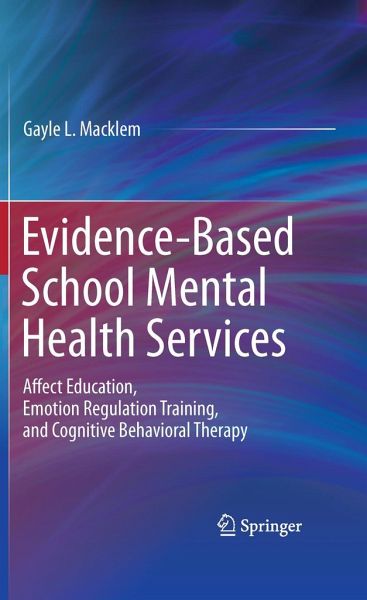
Evidence-Based School Mental Health Services
Affect Education, Emotion Regulation Training, and Cognitive Behavioral Therapy
Versandkostenfrei!
Versandfertig in 6-10 Tagen
76,99 €
inkl. MwSt.
Weitere Ausgaben:

PAYBACK Punkte
38 °P sammeln!
The challenges of providing mental health services to school children are numerous and diverse, ranging from staffing shortages to insufficient funding to family resistance to administrative indifference. Yet with the U.S. Surgeon General estimating that approximately 20% of young people display signs of psychological problems, the need for such services - particularly for interventions that not only address mental health issues but also reinforce protective factors - is considerable.Evidence-Based School Mental Health Services offers readers an innovative, best-practices approach to providing...
The challenges of providing mental health services to school children are numerous and diverse, ranging from staffing shortages to insufficient funding to family resistance to administrative indifference. Yet with the U.S. Surgeon General estimating that approximately 20% of young people display signs of psychological problems, the need for such services - particularly for interventions that not only address mental health issues but also reinforce protective factors - is considerable.
Evidence-Based School Mental Health Services offers readers an innovative, best-practices approach to providing effective mental health services at school. The author draws on the widely used and effective three-tiered public health model to create a school-based system that addresses the emotional and behavioral needs of students most at risk for experiencing, or showing strong signs and symptoms of, emotional problems or disabilities. This prevention-oriented program adapts cognitive behavioral and other clinical therapies for use in primary through high school settings.
In several concise, easy-to-read chapters, the author addresses such important topics as:
The rationale for building a three-tier mental health system in schools.The importance of making emotion regulation training available to all students.Designing strategies for adding affect education and emotion regulation training at each tier.Providing empirical support for implementing CBT in school settings.Preparing young children to benefit from school-based CBT.
Also included is an Appendix of specific group activities and exercises that can be put to use in the school setting.
Evidence-Based School Mental Health Services is a must-have resource forresearchers, scientist-practitioners, and graduate students in school psychology, clinical child psychology, pediatrics, psychiatry, social work, school counseling, education as well as for those who develop or influence public policy.And it is essential reading for any professional who is responsible for and interested in children's well-being and development.
Evidence-Based School Mental Health Services offers readers an innovative, best-practices approach to providing effective mental health services at school. The author draws on the widely used and effective three-tiered public health model to create a school-based system that addresses the emotional and behavioral needs of students most at risk for experiencing, or showing strong signs and symptoms of, emotional problems or disabilities. This prevention-oriented program adapts cognitive behavioral and other clinical therapies for use in primary through high school settings.
In several concise, easy-to-read chapters, the author addresses such important topics as:
The rationale for building a three-tier mental health system in schools.The importance of making emotion regulation training available to all students.Designing strategies for adding affect education and emotion regulation training at each tier.Providing empirical support for implementing CBT in school settings.Preparing young children to benefit from school-based CBT.
Also included is an Appendix of specific group activities and exercises that can be put to use in the school setting.
Evidence-Based School Mental Health Services is a must-have resource forresearchers, scientist-practitioners, and graduate students in school psychology, clinical child psychology, pediatrics, psychiatry, social work, school counseling, education as well as for those who develop or influence public policy.And it is essential reading for any professional who is responsible for and interested in children's well-being and development.













